Table of Contents
NOTHING beats delicious homemade bread! And as you can imagine, we are biased – our homemade bread recipe is the BEST!!
We’ve tested classic bread recipes time and time again, and this is the recipe we keep coming back to. Plus, it’s the one YOU guys keep coming back to. We use it for everything – French Toast, Grilled Cheese, Homemade Croutons – you name it!
The flavor is PERFECTION! But also – most of the ingredients can be found in your pantry, so you can make it any time. It also requires only about 20 minutes of hands-on work! The rest is rising and baking time.
And like most bread recipes, this is great to make ahead and store so you always have fresh bread on hand.
If you love a good bread recipe, you’ll also love our French Bread, White Bread, and Whole Wheat Bread!
Why we think you’ll love it:
- Made with pantry staples. The ingredients are simple and ones most everyone has on hand.
- Used for SO many recipes. It’s perfect for sandwiches like Grilled Cheese or a batch of French Toast.
- Cost-effective and healthier. Making homemade bread will cost about $1.25 worth of ingredients per loaf and you get to control the ingredients!
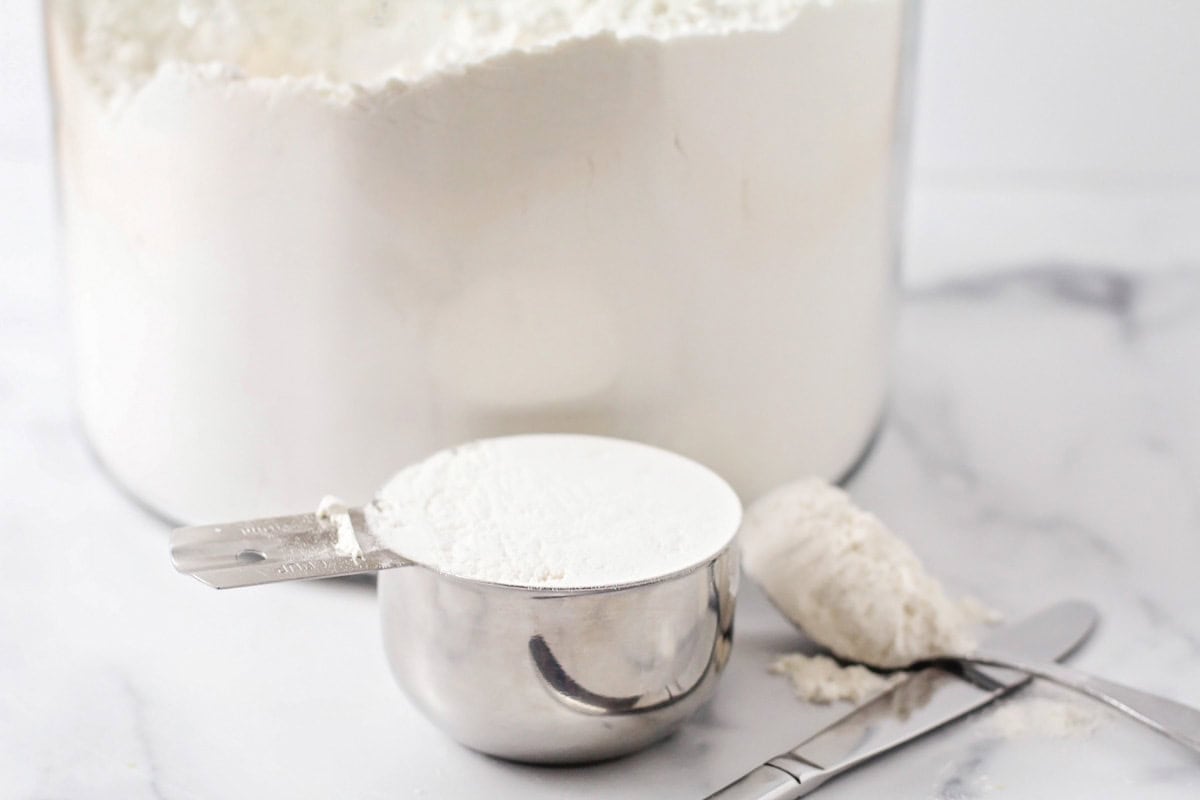
Homemade Bread Ingredients and Substitutions
- 2¼ teaspoons active dry yeast (1 packet) – If your yeast is old or dead, your bread will not rise correctly, if at all.
- 2¼ cups warm water – The water must be around 105-115°F.
- ¼ cup sugar plus 1 pinch
- 1 tablespoon salt
- 2 tablespoons vegetable oil – or canola oil or olive oil labeled for baking.
- 5½ – 6½ cups bread flour – or an equal amount of all-purpose flour (the texture will change a bit). To make bread flour: add 1 teaspoon of vital wheat gluten to a 1-cup measuring cup. Spoon all-purpose flour to fill the cup the rest of the way and sift.
- butter for topping (optional)
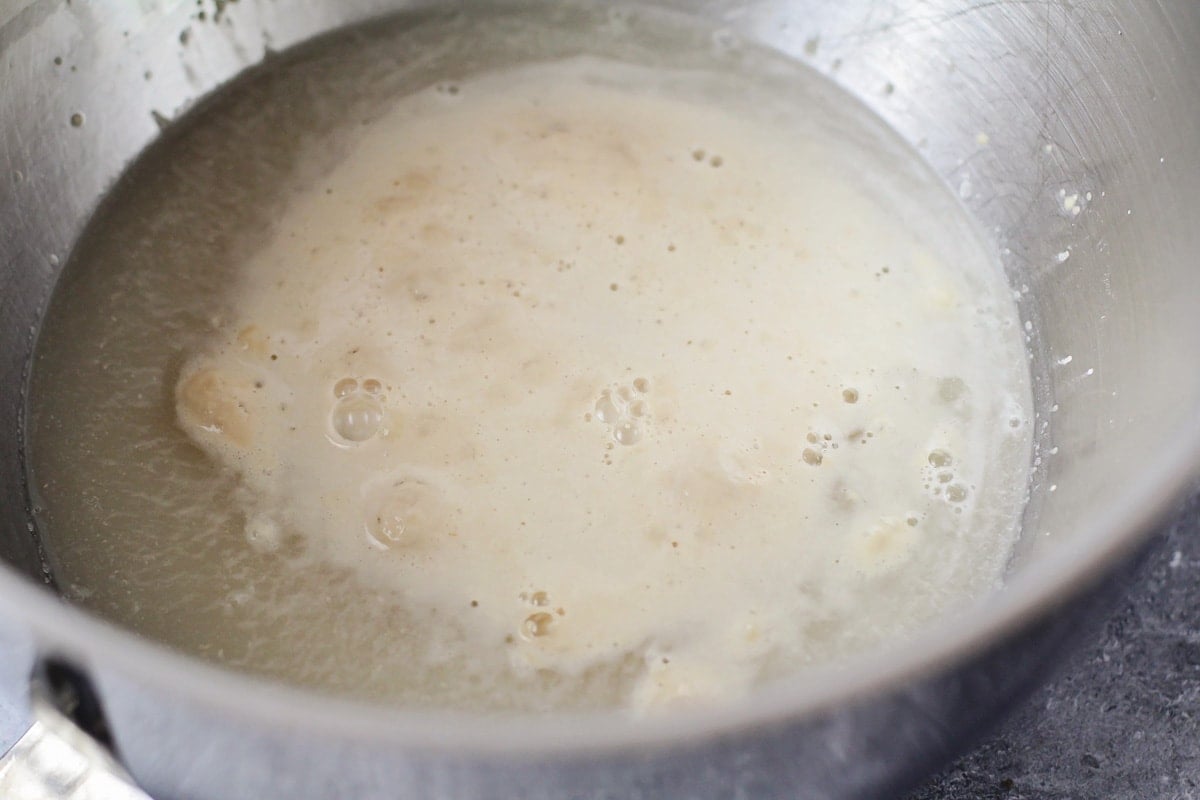
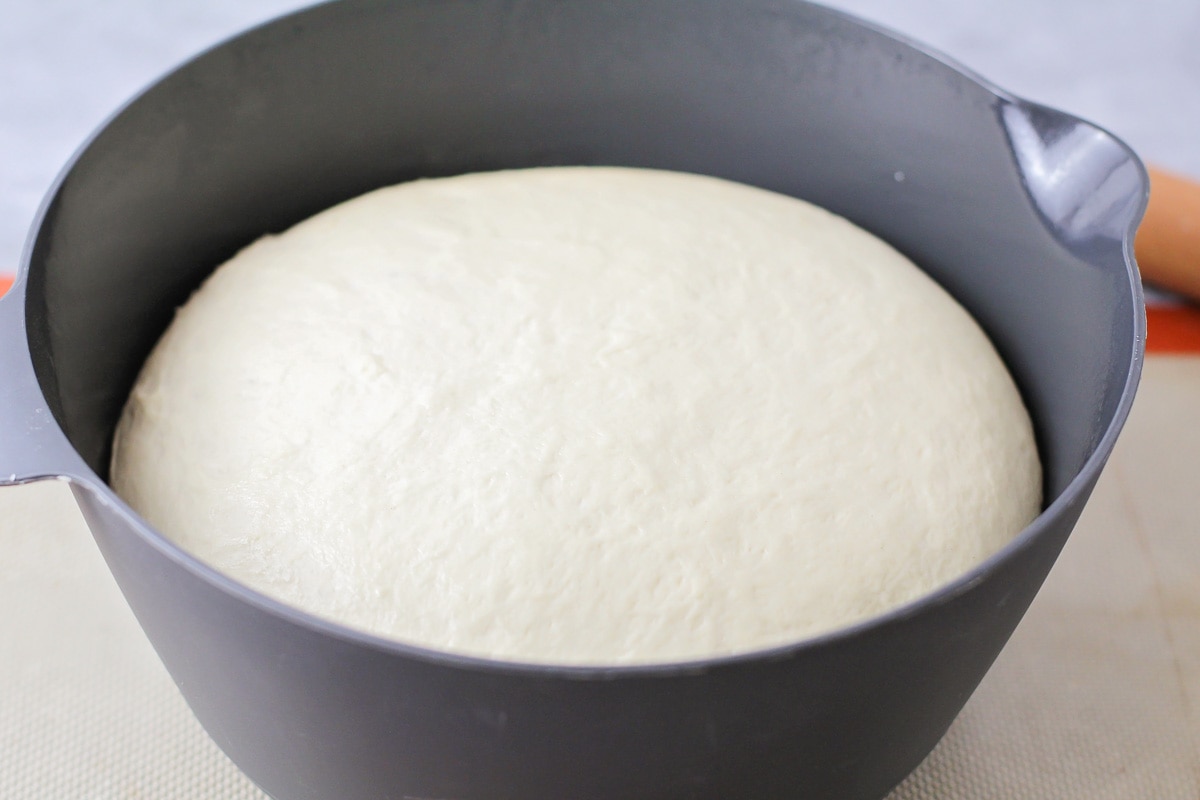
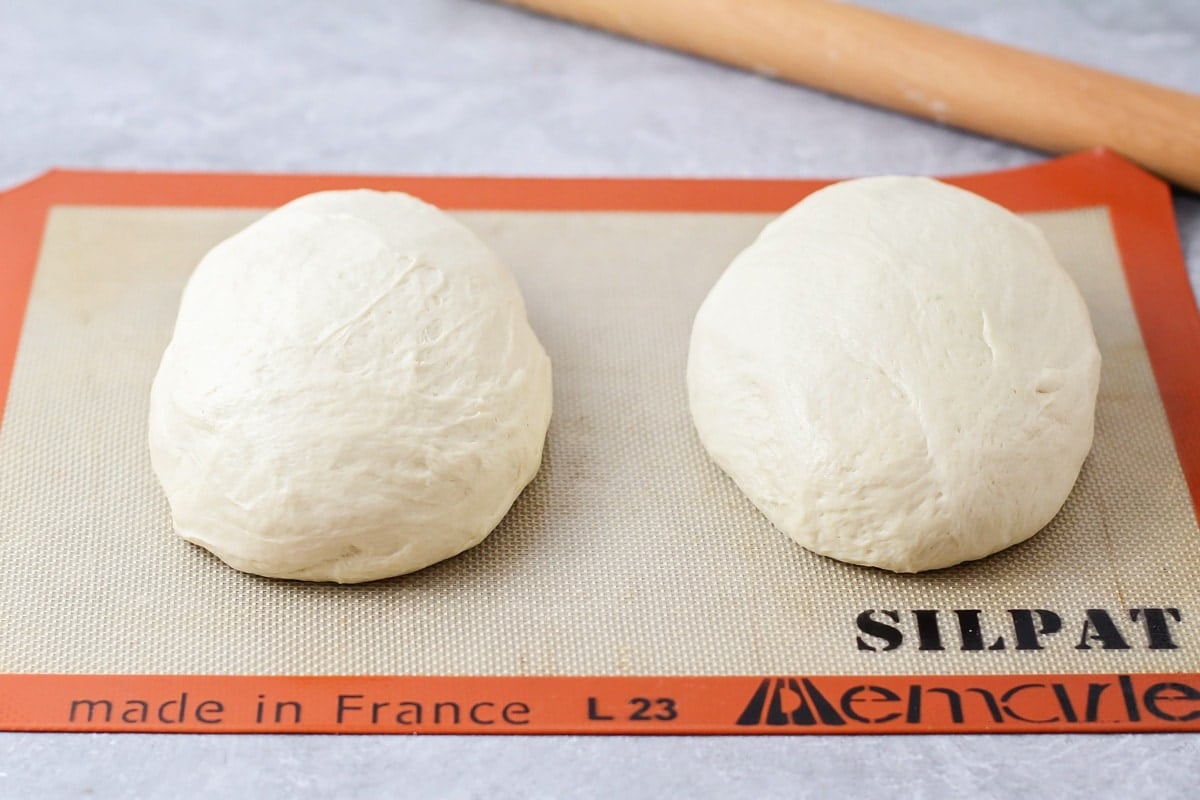
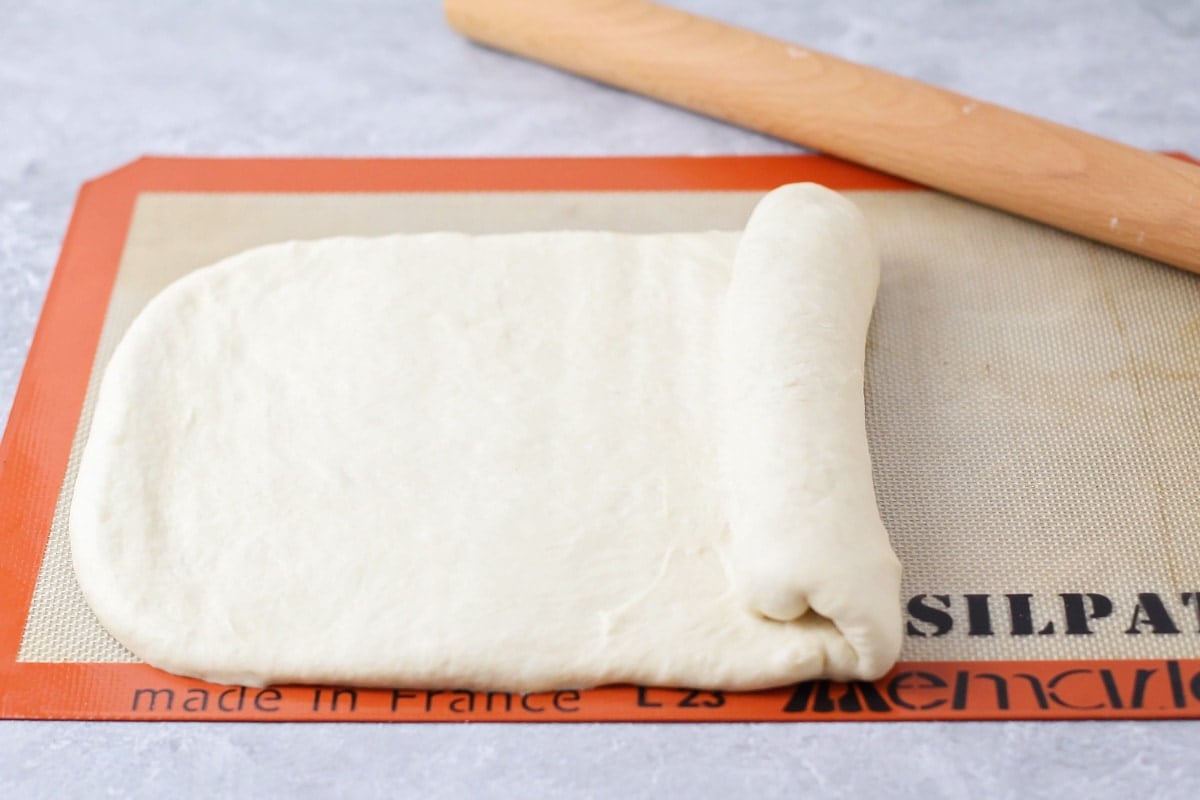
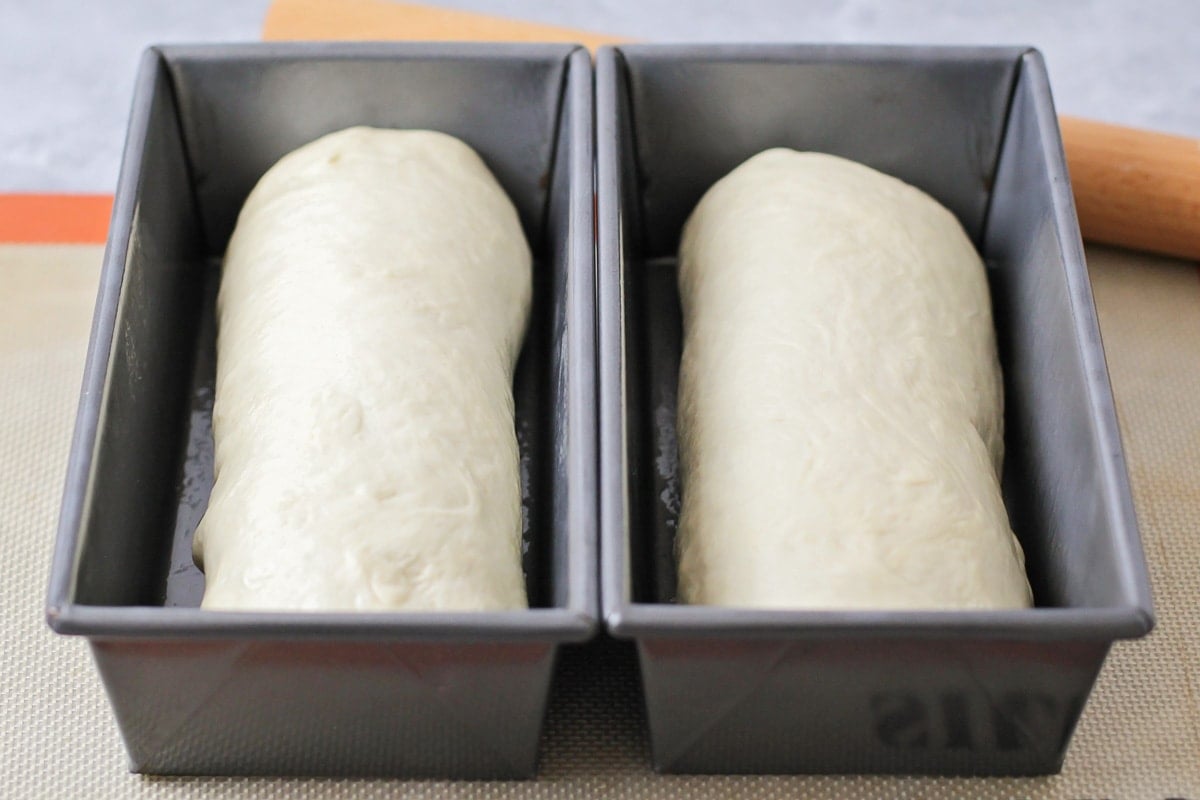
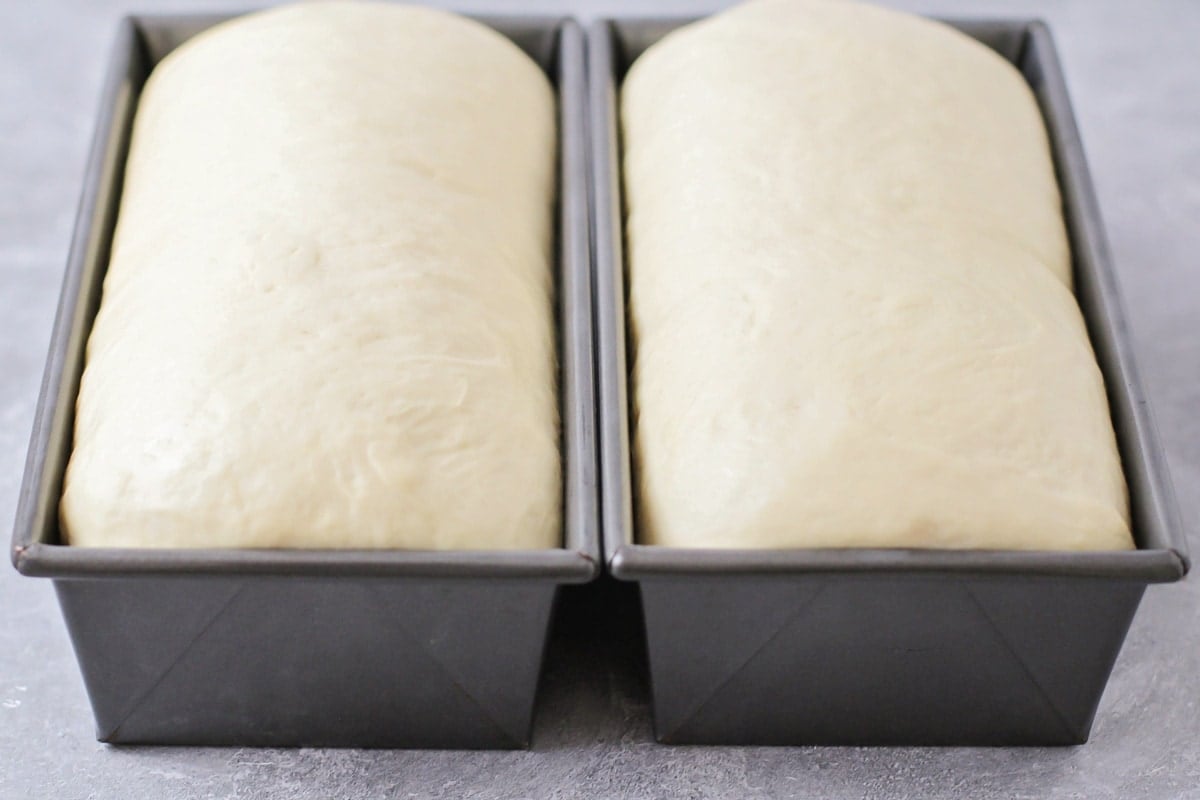
How to Make Homemade Bread
- DOUGH. In a large bowl or the bowl of a stand mixer, dissolve 2¼ teaspoons active dry yeast in 2¼ cups warm water with a pinch of sugar.
- When the yeast mixture is bubbly and foamy, add ¼ cup sugar, 1 tablespoon salt, 2 tablespoons oil, and 4 cups bread flour, and mix with a dough hook until smooth.
- Add the remaining 1-2 cups of flour, ½ cup at a time, to form a soft, smooth dough. The dough should stick just slightly to your finger when touched, but not be overly sticky.
- Knead with the dough hook on medium speed for 5-7 minutes, until smooth, then roll into a ball.
- RISE. Use olive oil or cooking spray to coat the sides of the bowl. Transfer the dough to the oiled bowl, turn over once to coat the top with oil, and cover with plastic wrap. Let rise for one hour, or until doubled for the first rise.
- SHAPE. When the dough has risen, punch it down gently and divide it in half. On a non-stick baking mat or lightly floured surface, roll each half of the dough into a long rectangle about 8 inches wide.
- Roll the dough up, starting at the short edge, to form a cylinder that is approximately 8 inches wide. Repeat with the remaining dough.
- 2ND RISE. Place the dough, seam side down, into lightly greased loaf pans, and cover with plastic wrap. Let rise for a second time for one hour, or until the dough is ½-1 inch higher than the top of the pan.
- BAKE. Preheat the oven to 375°F.
- Bake for 30-35 minutes or until the loaves are golden brown and sound hollow when tapped.
- SERVE. Brush loaves with a little melted butter after baking. Remove to a cooling rack and cool before slicing. Makes 2 loaves of bread.
- Use your bread in some of our favorite recipes: French Toast, Grilled Cheese, French Toast Bake, Garlic Bread, Homemade Croutons
Can you make this in a bread machine?
Of course! It’s super easy, and the machine does all the hard work for you!
- Layer the ingredients the right way! Add them in this order:
- Warm water
- Sugar
- Salt
- Oil
- Bread flour
- Active dry yeast (make a little well in the flour and place the yeast inside so it doesn’t touch the liquid right away!)
- Pick your settings: Use the basic bread setting and choose light or medium crust, depending on what you like best.
- Check the dough: After a few minutes of mixing, peek inside! If it looks too sticky, add a little more flour (one tablespoon at a time). If it’s too dry, add a tiny bit of water. You want the dough to be soft and slightly tacky.
- Let the bread machine do its thing! Once it’s done baking, carefully take out the loaf, let it cool on a wire rack, and—if you’re feeling fancy—brush it with a little melted butter. SO good!
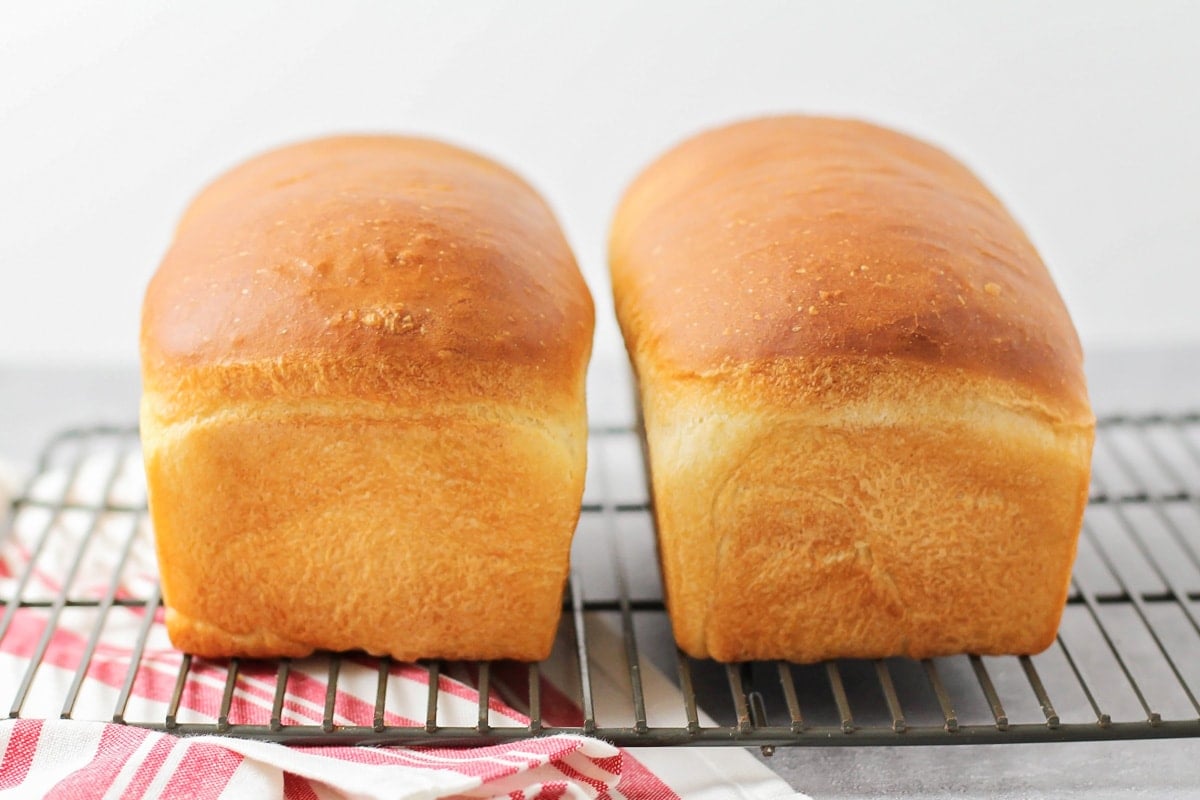
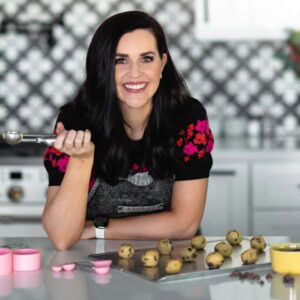
Kristyn’s Recipe Tips
- My #1 tip for any bread recipe is to Measure the flour accurately! Too much flour can result in dense bread, and we all know bread should be soft.
- Be sure to activate the yeast correctly otherwise, the dough will not rise.
- Watch the rise time. If you don’t allow it to rise long enough it will be dense. If you proof it for too long, it will fall and become unusable.
- For best results use bread flour. It creates a better structure and chewier texture than all-purpose flour, although we’ve used all-purposes in a pinch and it still works.
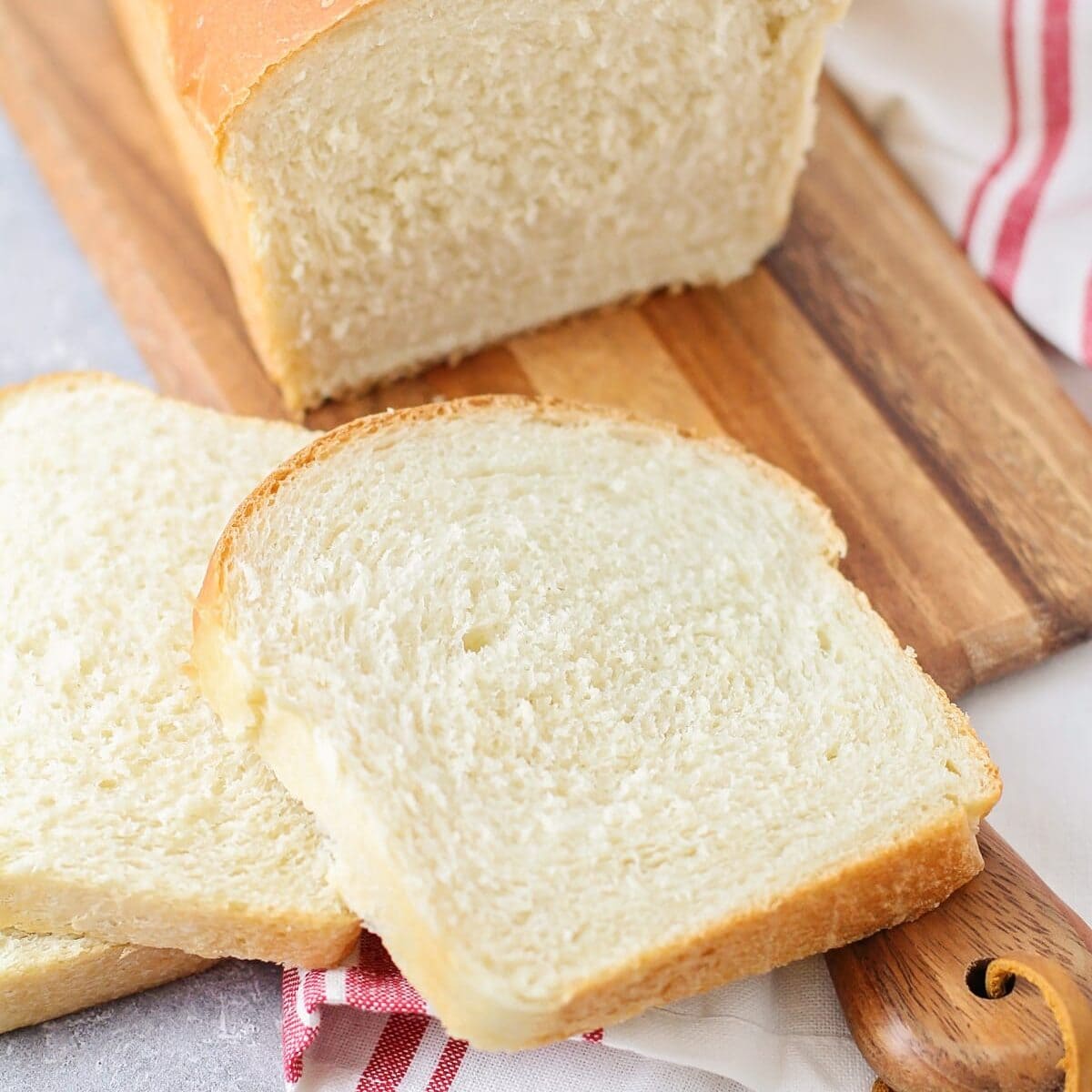
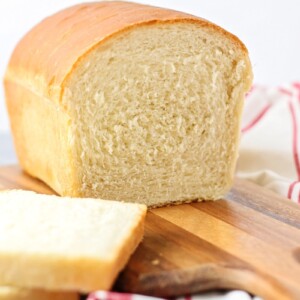
Homemade Bread Recipe
Equipment
- loaf pans
Ingredients
- 2¼ teaspoons active dry yeast, (1 packet)
- 2¼ cups warm water
- ¼ cup sugar, plus 1 pinch
- 1 tablespoon salt
- 2 tablespoons vegetable oil
- 5½ – 6½ cups bread flour
- butter for topping, (optional)
Instructions
- In a large bowl or the bowl of a stand mixer, dissolve the yeast in warm water with a pinch of sugar. When the yeast is bubbly and foamy, add the sugar, salt, oil, and 4 cups flour, and mix until smooth.
- Add remaining flour, ½ cup at a time, to form a soft, smooth dough. The dough should stick just slightly to your finger when touched, but not be overly sticky. Knead for 5-7 minutes, until smooth, then roll into a ball.
- Place the dough in an oiled bowl, turn over once to coat the top with oil, and cover with plastic wrap. Let rise for one hour, or until doubled.
- When the dough has risen, punch it down gently and divide it in half. Roll each half of the dough into a long rectangle about 8 inches wide. Roll the dough up, starting at the short edge, to form a cylinder that is approximately 8 inches wide. Repeat with the remaining dough.
- Place the dough, seam side down, into lightly greased bread pans, and cover with plastic wrap. Let rise for one hour, or until the dough is ½ – 1 inch higher than the top of the pan.
- Preheat the oven to 375°F. Bake for 30-35 minutes or until the loaves are golden brown and sound hollow when tapped. Brush with melted butter, if desired. Remove to a cooling rack and cool before slicing. MAKES 2 LOAVES.
Video
Notes
- To bake – unwrap and place in a greased bread pan. Cover with an oiled piece of plastic wrap. Allow it to thaw for several hours and then rise until it is about doubled in size. Bake according to recipe directions.
Nutrition
Nutrition information is automatically calculated, so should only be used as an approximation.
Recipe FAQ
Yes! You can totally swap instant yeast for active dry yeast in your recipe. The best part? Instant yeast doesn’t need to be dissolved in water first—just mix it right in with your dry ingredients, and you’re good to go! If your recipe calls for proofing the yeast first, you can still dissolve instant yeast in warm water to keep things consistent, but it’s not necessary. Just use the same amount, and your bread will turn out just as soft and delicious!
Place the bowl of dough near a warmer area in your home such as a warm slow cooker, sunny window, on top of a warm oven, or suspend above a bowl of steaming water.
Add an extra teaspoon of yeast and make the dough as directed. Allow the dough to rise the first time, then shape it into loaves and place them directly on a greased baking sheet. Place them in the freezer and freeze until solid. Wrap each loaf with plastic and again with aluminum foil. Label and freeze for up 3-4 months.
To bake – unwrap and place in a greased bread pan. Cover with an oiled piece of plastic wrap. Allow it to thaw for several hours and then rise until it is about doubled in size. Bake according to recipe directions.
Cool completely and place in a Ziploc bag or wrap in foil. Store at room temperature for 2 to 3 days. Place in a freezer-safe bag and freeze for 3-4 months.
More Like This
Artisan Bread Recipes
Sourdough Bread
8 hrs 40 mins
Focaccia Bread
8 hrs 55 mins
Baguette Recipe
15 hrs 14 mins
Italian Bread Recipe
2 hrs 40 mins
Bread Recipes
White Bread
3 hrs 15 mins
Whole Wheat Bread
3 hrs 15 mins
Easy Sandwich Bread Recipe
3 hrs 50 mins
No Knead Bread
3 hrs 14 mins
Collections
This recipe was first published December 2016.
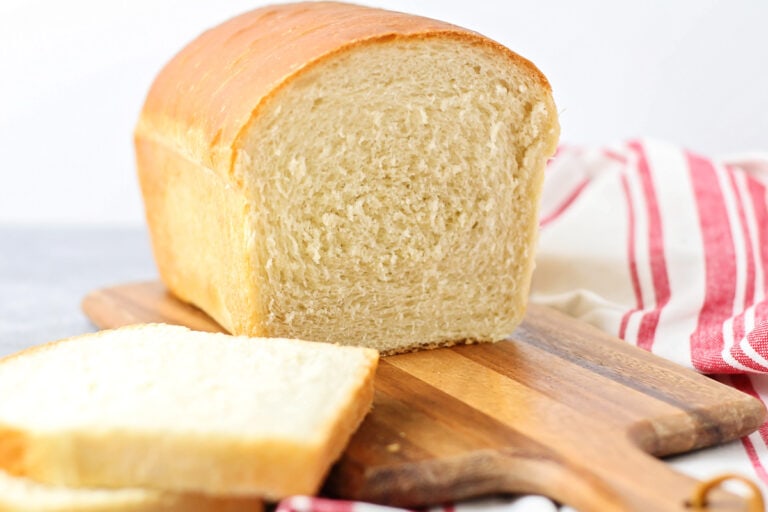
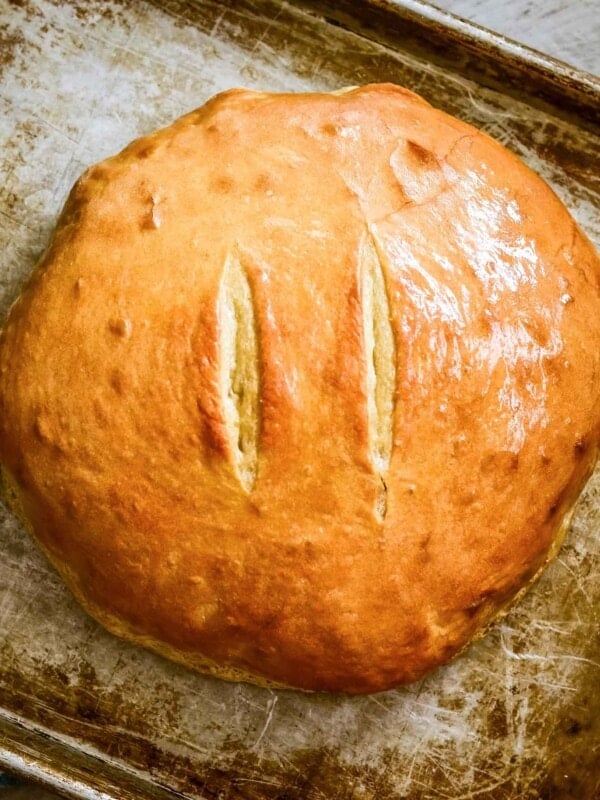
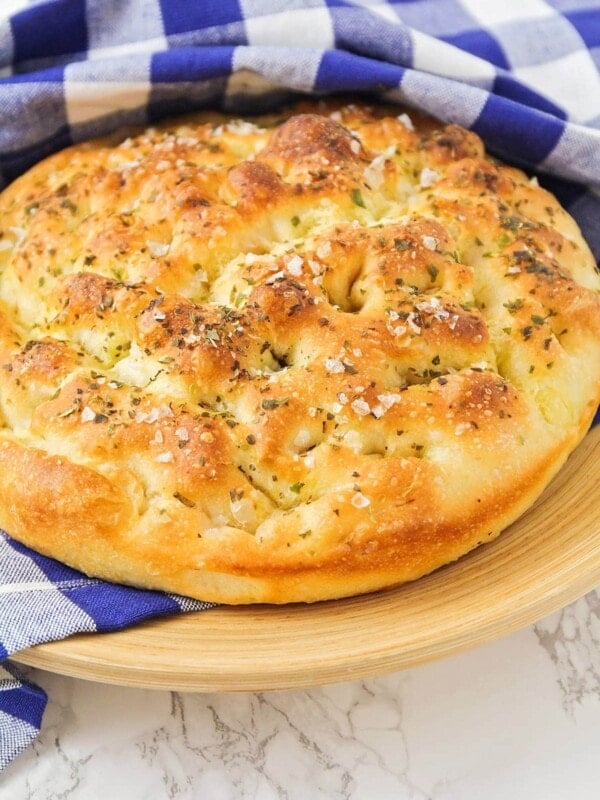
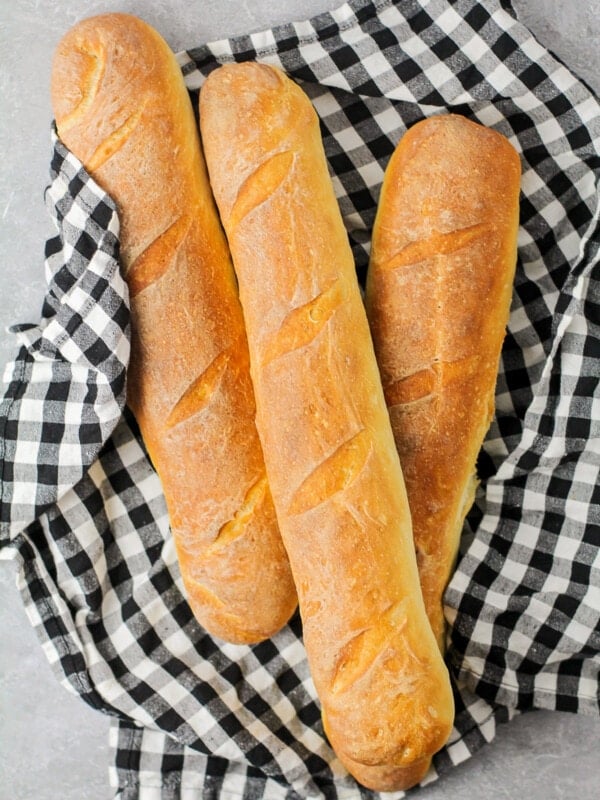

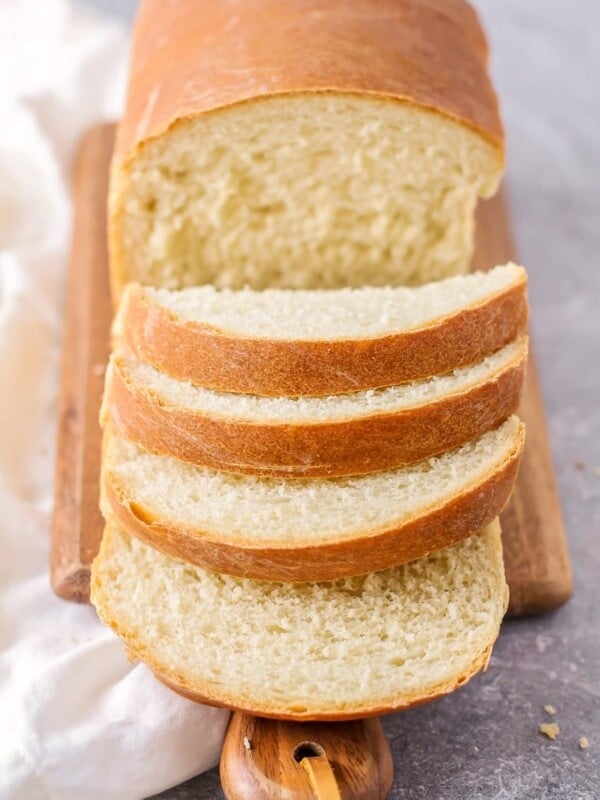
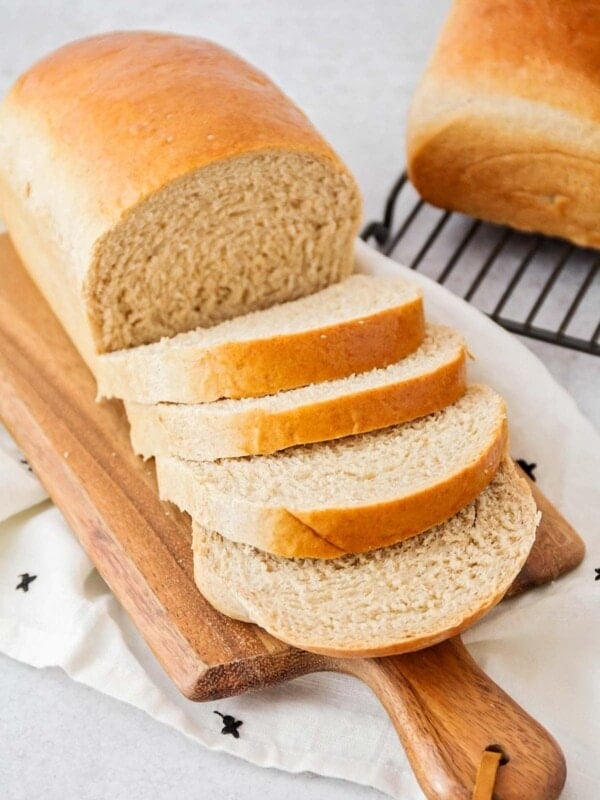

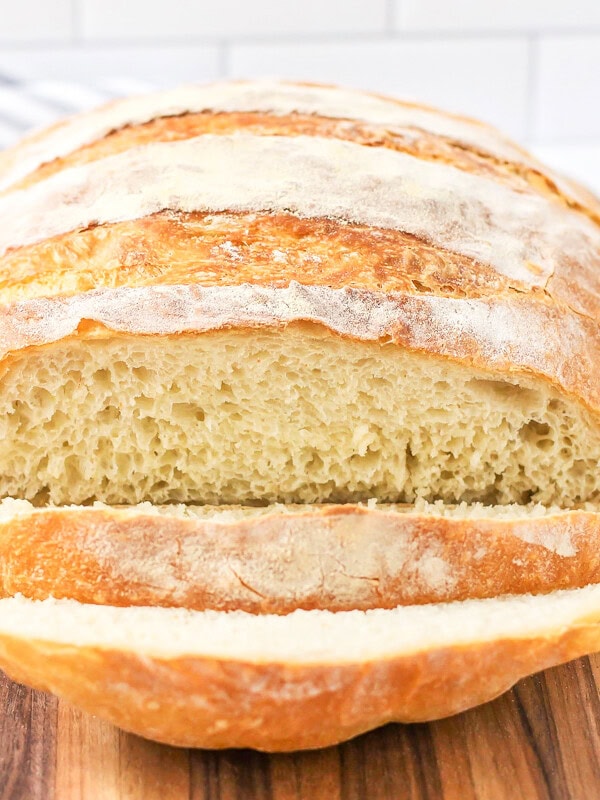
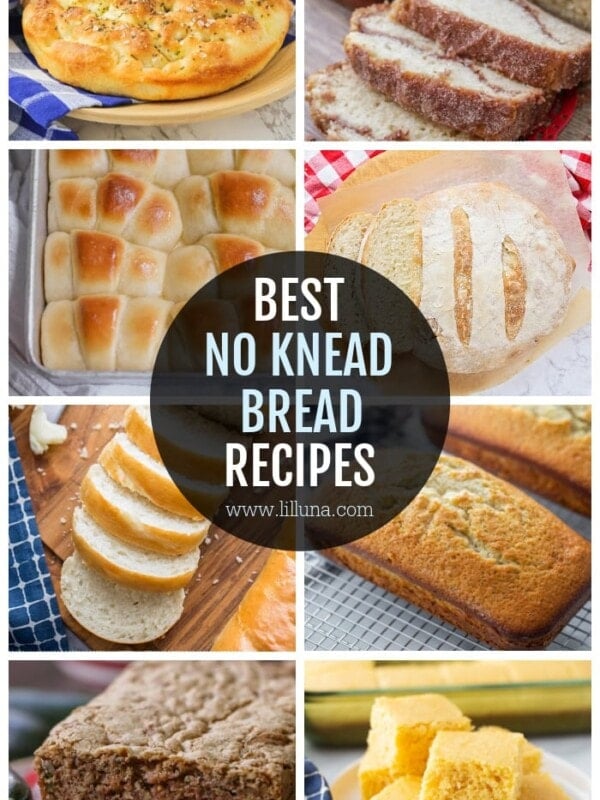
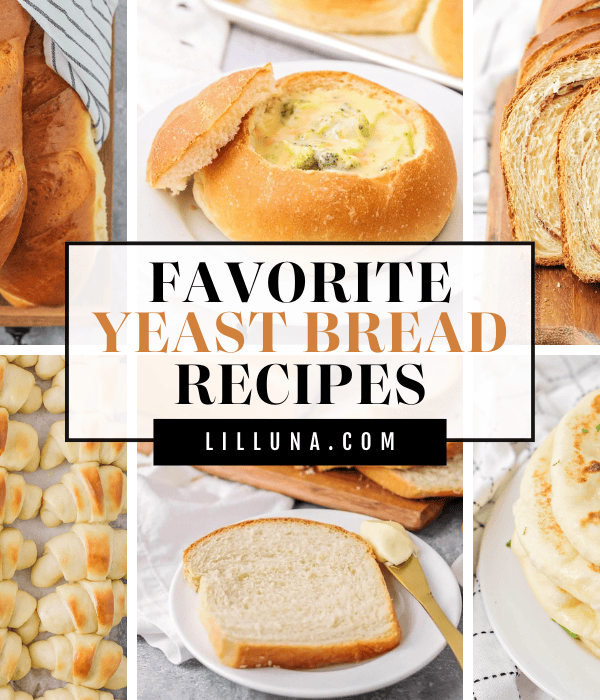
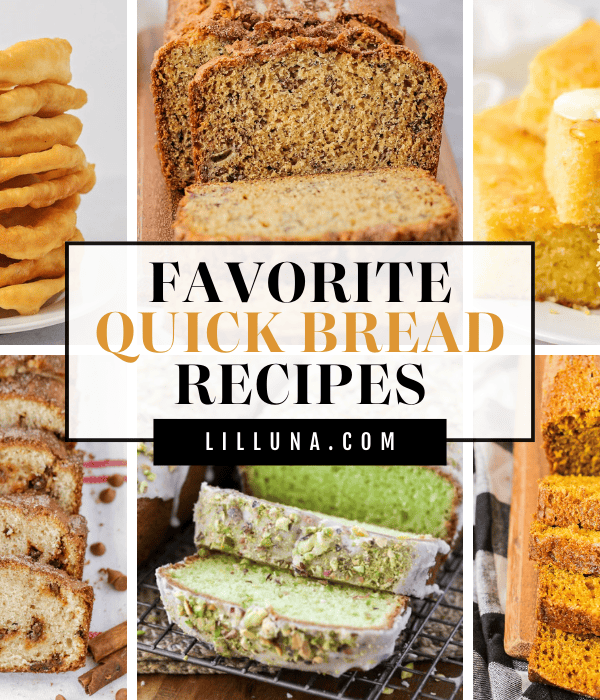

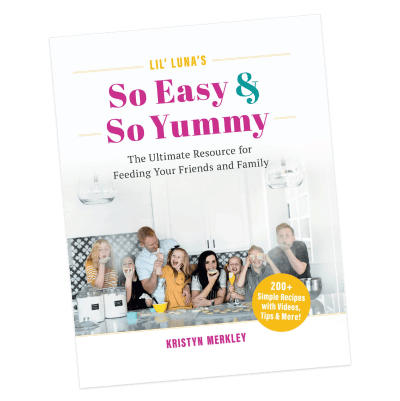








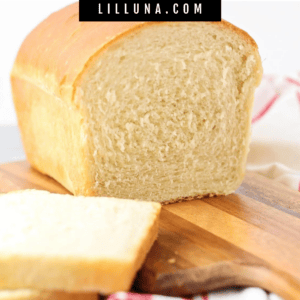
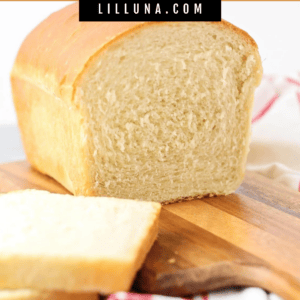
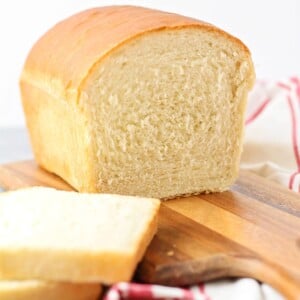
Literally the best homemade bread I have EVER had. I almost cried! The secret here is to go slowww and complete each step carefully. I am never buying bread ever again.
Thank you!!!
Yay!! I’m so glad you love the bread. A good homemade bread can’t even compare to store bought! So happy to hear you enjoyed it!
I am so grateful I came upon this recipe. The bread was so delicious. Thank you so much for sharing this.
Just tried today as my 1st bread baking experience. The crust turned out nice and crunchy like baguette as I really like. But the middle part is still not entirely cooked though I baked for about 35 minutes in 200°C. What could be the possible reasons so that I can improve in my next attempt please?
Way to try your hand at baking bread! So a few things could have been the case… 1) Making sure the oven is fully preheated. 2) Maybe the oven was a set too hot so the outside baked but the inside didn’t finish fully. 3) Also, I always wait until the bread is cool to cut into it because sometimes the inside appears doughy, but it hasn’t had time to let the steam dissipate. So fully cooling the bread may help as well. An undercooked loaf can be fixed if you return it to the oven too. Place the loaf back in a preheated oven at 350° F for 10-20 minutes. You can tent the bread loosely with foil to prevent it from browning further, if you’re worried about the outside being too done. Best of luck with the next round of bread making!!
Hey Good morning!!!
I want to bake a bread today but I want to make only one loaf please can you tell me for one loaf how much bread flour and yeast should be used?? And also sugar n oil too!!
You can just take the recipe and cut it all in half. The full recipe yields 2 loaves. So one loaf would be:
1 1/8 tsp yeast
1 1/8 cups water
1/8 cup sugar
1/2 tbsp salt
1 tbsp oil
2 3/4 – 3 1/4 cups bread flour
Another option is to freeze the extra loaf. Make the recipe as called for and after the loaves cool, you can put it in a bread bag and store in the freezer. Pull out and thaw when you’re ready to eat and it tastes fresh as can be!!
Very easy and delicious! I make this a lot! Just don’t forget the salt like I did once. Haha!
I’m glad this is a go-to recipe for you! Haha yes, that salt really does make a difference. 😉
Soft, moist, flavorful, and Oh so easy!
I make this every week and get requests from friends for loaves as well. Thank you for this terrific recipe!
Oh you’re welcome! I’m so glad to hear you (and your friends) love the bread!!
Is it okay to use warm milk while making the bread?
Yes, you can use milk. Just make sure it is warm — around 100-110 degrees Fahrenheit. Milk changes bread recipes by producing a softer loaf, due to the milk fat content, which can also give the bread a richer flavor. Bread made with milk also browns more easily (lactose or milk sugar will caramelize as it bakes). So just a few things to note. Hope it turns out yummy!!
Can you use whole wheat flour?
This bread is the best recipe I have ever had. Always turns out great. And I don’t want to buy store bought anymore!
Thank you!! I’m so glad you love the bread. Yes, you can use whole wheat flour. Here are a few things to consider when swapping out to whole wheat flour… whole wheat absorbs more liquid than white flour and produces a stiffer dough, which makes it harder to rise. So, I’d suggest for every cup of whole wheat flour substituted, increase the liquid in the recipe by 2 teaspoons. Then once you’ve mixed up the dough but before kneading, let it rest for 30 minutes. That gives the flour the time it needs to fully absorb the liquid which results in a softer dough. Then it should rise just as high as dough made with white flour. If you are using white whole wheat flour, then you should be able to do a straight substitution. Either way, you’ll have to let us know how it turns out with the whole wheat!
I am questioning the amount of salt. The abbreviation for teaspoon is tsp and for tablespoon is Tsp. This recipes abbreviation is confusing. I made this bread with 2 teaspoons. Is that the correct amount? The bread came out a little dense but tasted very good.
The recipe calls for 1 Tbsp (tablespoon), which is 3 tsp (teaspoons), so using 2 tsp was very close! The bread probably tasted a lot the same as if made with the full amount. 🙂
in the last step, you mentioned 375, is it faurenheit or degree celsius?
I’m pretty sure it’s Fahrenheit.
Yes, it is in Fahrenheit!
Loved it, worked perfectly! Thank you 🙂
You’re welcome! Glad to hear you enjoyed the bread.